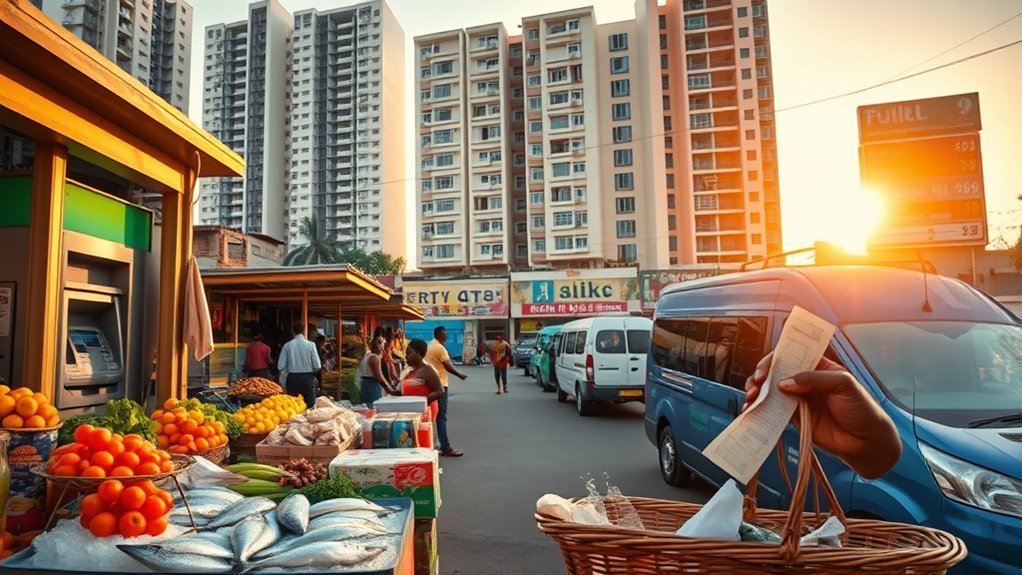You’ll typically need $700–$1,500 monthly for a modest single-person budget covering food, utilities and local transport, while an expat family can easily spend $3,500–$10,000+ once you add city-center rent, international school fees and private healthcare. Staples (bread, rice, milk) stay relatively affordable, but imported goods, high rents in Luanda, generator costs and schooling drive prices up. Keep going and you’ll find detailed breakdowns and practical ways to cut costs.
Cost Breakdown: Daily Essentials and Groceries
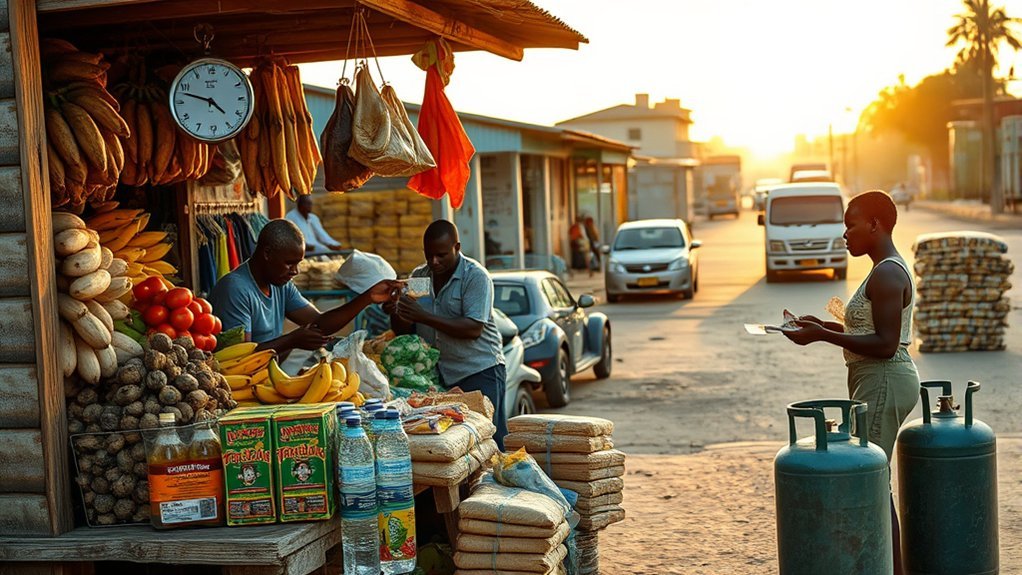
While prices vary by city and market, daily essentials in Angola are relatively costly for imported or premium items but reasonable for staple goods: a 500g loaf of white bread is about $1.18, 1 L of milk $1.41, and 1 kg of rice $0.82, while chicken fillets run near $5.98/kg and beef around $9.90/kg (with premium imports reported up to $45/kg).
Imported goods in Angola can be pricey, but staples like bread, milk and rice remain affordable.
You’ll find water (1.5 L) at roughly $0.44 and a 0.5 L domestic beer in a pub near $1.53.
For budgeting, note a single person’s monthly food-only expenditure averages about $684.70, while a family can spend around $2,000 on groceries.
Basic utilities average $46.50 per month per person and internet (50–60 Mbps+) ranges $78–$133/month.
These figures inform Cost of Living assessments used by policymakers and employers when setting wages, allowances, and subsidies. You should factor imported item premiums, market volatility, and household composition into any realistic household budget or policy recommendation.
Housing and Utility Costs Across Cities
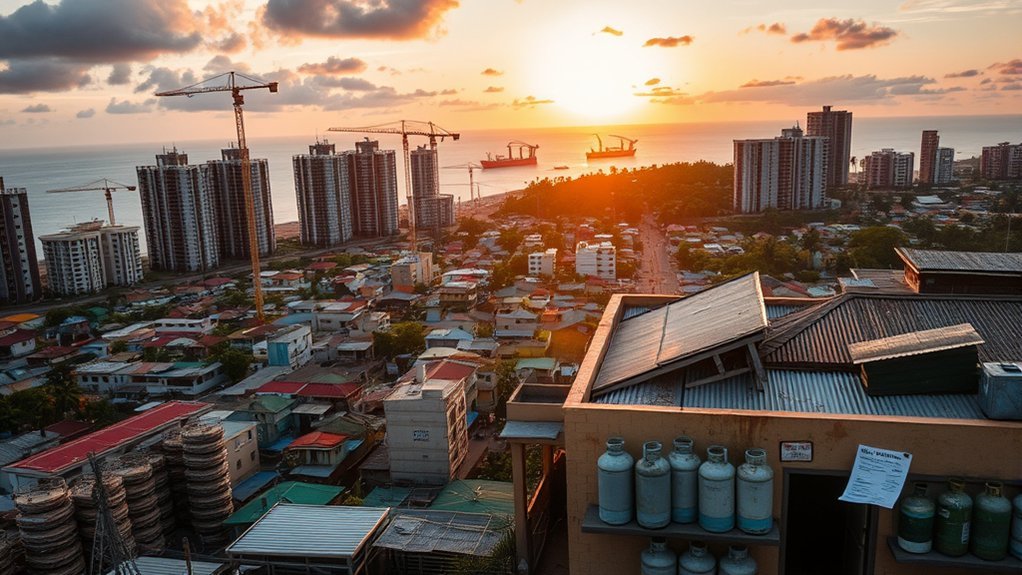
After accounting for food and utilities, housing emerges as the single largest and most variable expense across Angolan cities.
You’ll find a 1‑bedroom apartment in city centers averages about $404/month, with cheap options near $232; reported city‑center averages range $328–$1,434, reflecting location and quality.
A 3‑bed apartment averages $1,352/month, but city‑center rentals can reach $1,845–$7,300.
In Luanda and newer suburbs like Talatona, high‑end expatriate apartments command $4,000–$15,000+; family homes may cost $6,000–$30,000.
Typical utilities for an ~85 m2 apartment run roughly $46.50–$96.11 monthly; unlimited 50–60 Mbps internet is commonly $78–$133.
Mortgage financing is constrained by very high interest (around 24% for 20 years), so renting often dominates housing choices.
For policy and planning, these spreads imply significant affordability gaps and a need for targeted supply-side interventions and financing reforms to stabilize rents and broaden access to quality housing.
Transportation, Healthcare, and Services
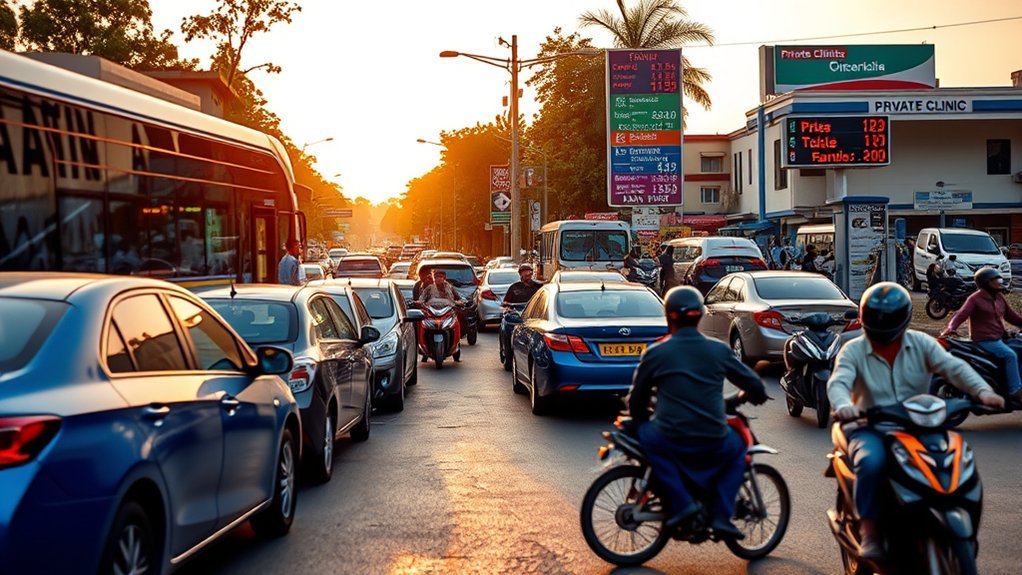
You’ll find public transport extremely cheap—single tickets run about $0.35–$0.53 and a monthly pass near $25.50—while an 8 km taxi costs roughly $8.27, and low fuel prices (~$0.30/L petrol, ~$0.40/L diesel) keep private vehicle operating costs down.
Basic utilities average $46.50/month for one person but frequent power outages often force generator use, raising expenses, and internet at 50–60+ Mbps typically costs $78–$133/month.
Expect private healthcare consultations around $38.70, with international-standard care and insurance substantially more expensive, which should factor into any household budget or policy planning.
Public Transport Costs
Expect public transport in Angola to be inexpensive for short trips: a one‑way local ticket runs about $0.35–$0.53 and a monthly transit pass is roughly $25.50, making mass transit far cheaper than taxis or private car use.
You’ll find ticket local fares keep urban mobility affordable, supporting daily commuting without heavy subsidy needs. Policy implications: low fares promote access but can strain operator revenues if subsidies aren’t maintained.
By contrast, an average 8 km taxi ride costs about $8.27, highlighting modal cost disparities that shape traveler choice. While fuel prices (≈ $0.30/l petrol, $0.40/l diesel) reduce private running costs, they don’t erase higher taxi fares.
Plan budgets assuming mass transit for routine trips and taxis for occasional convenience.
Private Vehicle Expenses
Factor in very low fuel costs—around $0.30 per litre—when budgeting private vehicle use, but don’t assume ownership will be cheap overall: taxis (≈ $8.27 for an 8 km trip) and rentals ($90/day for a basic saloon to $200/day for an SUV) illustrate that hire-and-drive options can quickly outstrip fuel savings, while imported insurance, spare parts and maintenance often push ownership costs higher and can complicate vehicle uptime.
You’ll find operating fuel is inexpensive, lowering per-km costs, but routine ownership expenses are elevated by import dependence and logistics. In expensive cities maintenance delays and premiums can be pronounced.
For short stays, compare daily rental versus repeated taxi fares; for long-term residence, model total cost of ownership including insurance, parts lead times, and potential downtime.
Healthcare & Medical Fees
Although basic consultations average around $38.70, private healthcare in Angola quickly becomes costly once you factor in specialist fees, dental work and minor procedures that often exceed regional norms, especially in Luanda where international-standard care is concentrated. You’ll find public emergency transport limited; private ambulance or transfer services are expensive and typically arranged via employers or insurers. Expat private insurance premiums are substantial but often necessary to cover pricey private care and medical evacuation. Emergency evacuation to regional hubs or abroad can run into thousands or tens of thousands of dollars, so extensive coverage is essential.
| Service | Typical Cost | Notes |
|---|---|---|
| GP visit | $38.70 | Public/private gap |
| Specialist | Variable | Often expensive |
| Evacuation | Thousands+ | Requires insurance |
| Dental/minor | Variable | Above regional norms |
Education and Family Living Expenses
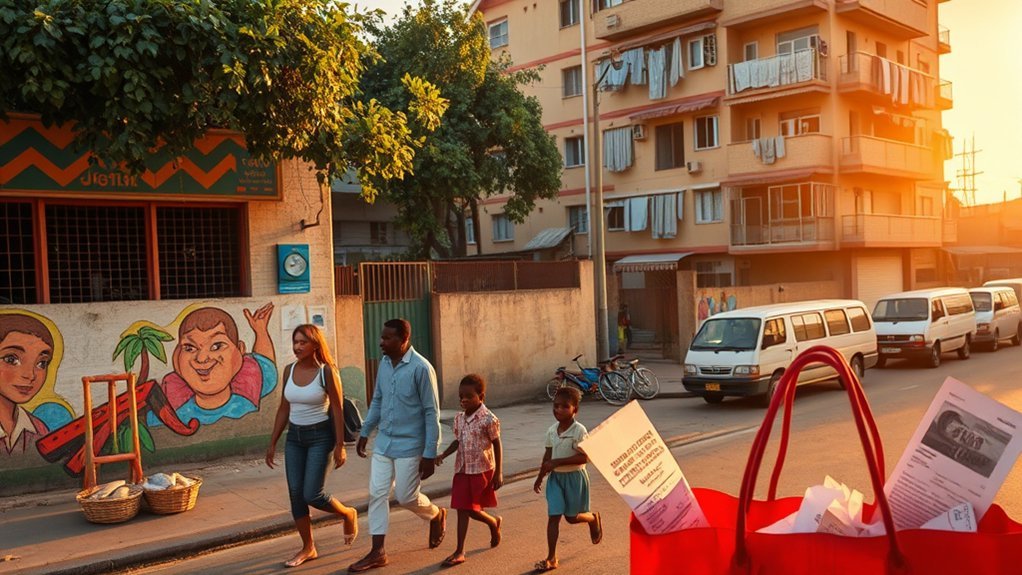
When planning a household budget in Angola, you should account for steep education costs: international primary tuition typically runs about $14,766–$19,880 per child annually and private preschool/daycare costs around $695–$823 per month.
Combined with estimated non-rent family-of-four monthly expenses of $2,396–$2,779 and high-end housing rents of $6,000–$30,000 in Luanda suburbs, schooling can drive total family spending sharply upward.
Many expatriate contracts consequently include allowances for housing, school fees and transport to offset local wages that are often insufficient to cover these outlays.
School Fees and Tuition
Because international schooling in Angola carries exceptionally high fees, you’ll often find education costs taking up a large slice of an expatriate household budget.
School fees and tuition for international primary education typically run $14,766–$19,880 per year, often matching or exceeding several months’ local net salary (≈ $1,504/month).
Employers commonly include education allowances in compensation packages because those tuition lines can rival housing and transport costs.
The steep charges reflect limited local alternatives and high operational expenses, so you should budget accordingly and verify package coverage.
For planning, compare school fee schedules, annual increases, and extra charges (registration, uniforms, exams).
Policywise, negotiate clear allowance terms and contingency for unexpected fee hikes when relocating to Luanda.
Childcare and Preschool Costs
Typically, childcare and full‑day preschool in Angola will take a sizable bite out of your household budget: private monthly preschool fees average roughly $695–$824 per child, while international primary tuition jumps to about $14,766–$19,880 per year, so plan for education costs that can rival housing or several months’ local net salary.
You should expect daycare and preschool costs to represent a large share of family income; service is subject to location, facility standards, and expatriate demand.
When budgeting, include transport and extracurriculars that push totals higher.
Compare local versus international options carefully and factor exchange‑rate risk and fee escalation clauses.
- Local private preschool: ~$695–$824/month per child.
- International primary: ~$14,766–$19,880/year per child.
- Total annual family exposure: can reach tens of thousands after extras.
Education-Related Living Expenses
Frequently, education-related living expenses take up a large slice of household budgets in Angola: international primary school fees alone average $14,766–$19,880 per child per year.
You should budget accordingly: monthly private preschool/full-day childcare typically runs $695–$824 per child, and combined education costs contribute markedly to a typical monthly family expenditure (excluding rent) of about $2,396.0.
Many expatriate contracts consequently include salary adjustments or school-fee allowances, recognizing international schooling can exceed local net salaries near $1,503.77.
When you plan use a conservative scenario that adds transport, uniforms, supplies and after-school activities—these extras are commonly charged separately and can add several hundred to thousands of dollars annually.
Policy-makers should monitor affordability and access implications.
Why Prices Are High: Structural and Market Factors
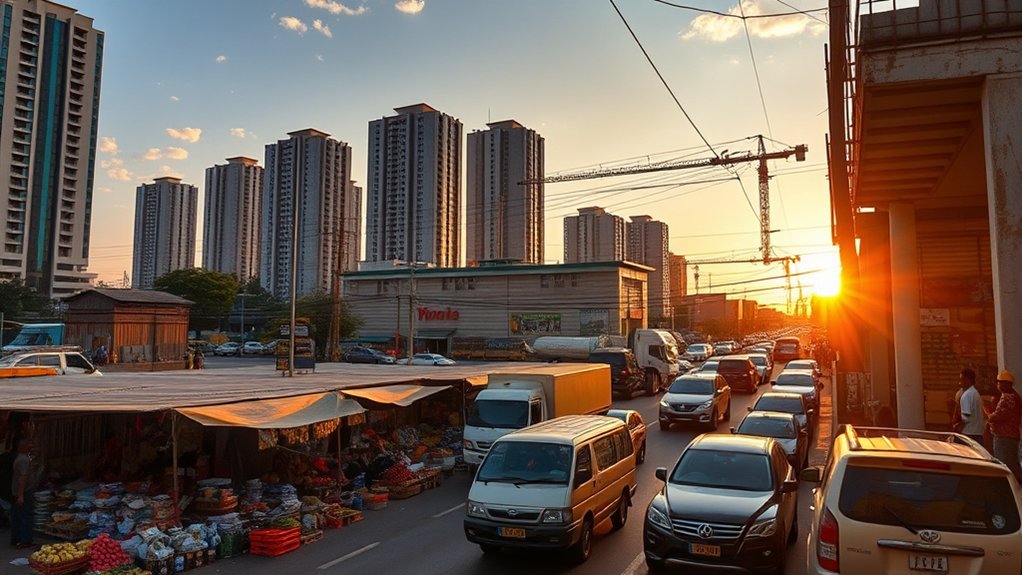
When you look past headline inflation rates, Angola’s high prices stem from structural damage and market distortions that keep supply tight and costs high: decades of civil war wiped out much local industry and agriculture, so roughly 80% of consumable goods are imported and burdened by shipping and import fees; congested ports, slow customs procedures and steep local taxes add handling delays and extra charges; unreliable power and weak transport infrastructure force businesses to use costly generators and logistics; and a concentrated import sector plus strong demand from wealthy households and expatriates lets sellers sustain premium markups on scarce imported items, while expensive housing, transport and international schooling further push up overall living costs.
Beyond headline inflation, Angola’s high prices reflect war‑scarred supply chains, costly imports, clogged ports, weak infrastructure and concentrated markets.
You face repeated cost layers: import costs, infrastructure premiums and concentrated market pricing.
Three concrete illustrations:
- Port and customs delays: longer dwell times add container demurrage and storage fees.
- Power and logistics: generator fuel and private transport raise unit costs for producers.
- Market concentration: few importers maintain price cushions against competition, amplified by high local taxes.
Money‑Saving Tips for Expats and Locals

Given the structural and market pressures that keep prices high, you can still cut household spending through targeted choices and negotiation. Compare competing supermarkets and growing Chinese farm markets; use an estimated monthly costs benchmark of roughly $2,000 for family groceries as a planning anchor. Cook at home, batch-make staples (cakes, yoghurt) and stock non-perishables before travel—initial kitchen stocking runs about $800.
Buy local produce from street vendors and haggled markets to avoid imported items (tomatoes cited up to $16/kg, beef up to $45/kg). Share housing or move to newer suburbs where rental competition has pushed two-bedroom rates below the $4,000–$5,000 range; expect Talatona high-end up to $15,000. Use local taxis instead of daily car rental (saloon ~$90/day, SUV ~$200/day) and deploy energy-saving measures while planning generator fuel costs. Negotiate expatriate packages to cover housing, schooling (international school $14,000–$19,000/year) and transport to materially reduce living expenses.
Frequently Asked Questions
Is Angola Expensive to Live In?
Yes — you’ll find Angola expensive, especially Luanda, where expatriate rents and imported groceries skyrocket; however, costs vary by neighborhood, lifestyle and local sourcing, and recent market shifts have reduced some rents and grocery prices.
How Much Is a Burger in Angola?
A stitch in time saves nine: you’ll pay about $3–$7 for a fast-food burger, $4–$8 at mid-range restaurants, often higher in Luanda due to imports; street vendors can offer options under $3, quality varies.
What’s the Average Salary in Angola?
The average salary in Angola is uncertain, but you’ll typically see figures around $1,504 monthly net or GDP per capita near $2,831; you should verify with current local statistics due to large data discrepancies and expatriate adjustments.
Is Angola a Good Place to Live?
Yes — it can be, but it depends. You’ll enjoy vibrant culture and investment potential, yet face costly expat living in Luanda, low local wages, spotty infrastructure, and security concerns; plan, budget, and use local strategies.
Conclusion
You’ll see prices bite faster here than in many places — groceries, rent and import‑dependent goods push monthly costs high. Yet city choice, school selection and whether you use private healthcare change the math a lot. If you plan, budget and tap local networks, you can limit shocks; ignore inflation trends and policy shifts and you’ll feel them. Decide soon: your lifestyle will determine whether Angola becomes affordable or increasingly costly.

